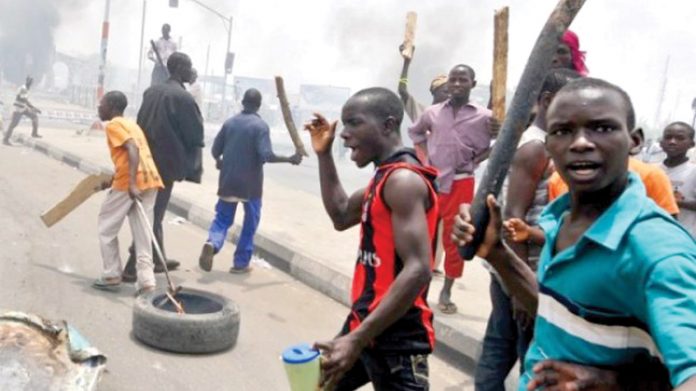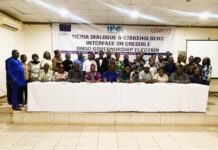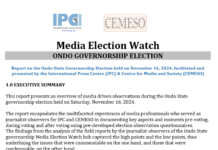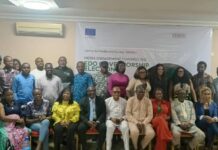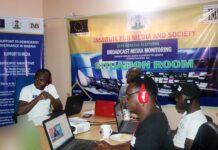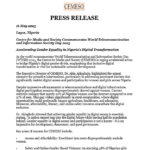“In INEC, we are not so much concerned about who wins or loses but in the integrity of the electoral process. What we saw last Saturday was the lowest level of electoral discredit. INEC was ready but the elite aided by the uniformed security personnel spoilt the process. What is clear from our observations is that the elite of Rivers State will determine the electoral progress of this state. Their conduct last Saturday is condemnable and reprehensible by the standard of any decent society”
–Rivers State Resident Electoral Commissioner, Mr. Obo Effanga, speaking on the aborted Port Harcourt State Constituency III bye-election on August 18, 2018.
For the umpteenth time, some Nigerian politicians have demonstrated their bestial nature by turning a routine civic exercise to a power struggle between two contending political camps. A state constituency election in Rivers State last Saturday turned into a nightmare for election officials and the electorate. There were thousands of security personnel deployed to secure the environment but they were not armed in accordance with international best practice. Unfortunately, according to reports, their colleagues who were at the behest of political gladiators in the state provided cover for hoodlums to destroy election materials, harm poll officials and voters. A similar thing happened in Kogi State barely a week ago. According to news reports, two people lost their lives in the state on Saturday, August 11, 2018 as widespread violence marred the bye-election conducted to fill the vacant position of Lokoja/Koton-Karfe Federal Constituency in the House of Representatives.
Electoral violence is not a modern-day phenomenon in Nigeria. The First Republic (1960 – 1966) collapsed due to the widespread violence unleashed by politicians in the disputed 1964/65 general election. Historians and political scientists recall the ugly incident tagged, ‘Operation We-ti-e; literarily meaning, ‘Operation spray it!’ in the Western Region in which many notable politicians and their supporters were murdered in broad daylight. This largely warranted the first military coup of January 15, 1966. At the return to civil rule in 1979, politicians displayed their incorrigibility as they, again, resorted to electoral violence and fraud, especially during the August 1983 general election. Political observers also recall the Akin Omoboriowo versus Governor Adekunle Ajasin saga in the old Ondo State where the electoral fraud allegedly perpetrated by the National Party of Nigeria stalwarts in the state led to three days of mindless killings and arson. That again was part of the reasons the military struck on December 31, 1983.
Fast forward to the Fourth Republic. Nigeria has had five successive general elections (1999, 2003, 2007, 2011 and 2015) with each of them recording high electoral violence. Indeed, over 800 lives were reportedly lost to pre and post-election violence in 2011 particularly in about 12 Northern Nigerian states. Ten youth corps members serving in Bauchi State were among the casualties. The high number of deaths and destructions necessitated the setting up of the Sheik Ahmed Lemu presidential committee which looked into the immediate and remote causes of the crisis and came up with far-reaching recommendations which former President Goodluck Jonathan largely ignored. The only major thing done was to pay some modest compensation to some of the victims of the violence. However, nothing much was done in terms of bringing the alleged masterminds and arrowheads to justice, till date, to the best of my knowledge.
Seven years after, impunity still reigns. Rivers State recorded the highest number of cases of election-related violence in the run-up to 2015 general election and afterwards. Attempts by the Independent National Electoral Commission to hold re-run and bye-elections in the state had been largely thwarted by political gladiators who obviously are above the law. In fact, the state became the political Golgotha of Nigeria so much so that it was renamed “Rivers of Blood”. What an anathema! Thus, last Saturday’s electoral violence was not an isolated incident.
Another major challenge facing Nigeria’s elections is vote-trading. Again, like electoral violence, this is also not a recent development in our polity. It has been with us from the post-colonial era. However, hitherto, it had been discreetly done. Then, politicians gave naira embedded loaves of bread to voters. Vote-buying philanthropic gestures were unveiled close to election periods. For instance, different empowerment programmes were initiated in order to curry the favour of the electorate. While this method is still in use, the phenomenon of vote-buying has become an open bazaar where politicians brazenly induce voters with cash. It goes by different names such as “Stomach infrastructure”, “See and Buy”, and “Family support”, among others.
It is important to note that vote-buying is not solely a Nigerian or African problem but a universal challenge. However, the level of prevalence may be more on the continent. It is also not a one-party phenomenon neither is it confined to any geopolitical environment or religious suasion. According to Gram Matenga, Senior Programme Officer for the Africa and West Asia region for International IDEA, in an 0ctober 11, 2016 article entitled, Cash for Votes: Political legitimacy in Nigeria, “Nearly 80 per cent of voters from 36 African countries believe voters are bribed – either sometimes, often or always. In Morocco and Nigeria alone, only five per cent and six per cent of the citizens believe bribing for votes never happens. This is a particularly chronic problem in Nigeria, where in 2007 seven out of ten voters believed that vote-buying happens either ‘all of the time’ or ‘most of the time’; nearly a decade later, nine out of 10 believe so. Furthermore, 16 per cent of voters in African countries reported being offered money or goods in exchange for their vote during the last election.”
Vote-buying in Nigeria has reached an alarming proportion to the extent that politicians have spread their tentacles of inducements to election officials, security agencies, election observers and even the media. This ugly phenomenon has astronomically increased the cost of elections; created an uneven playing field for electoral contestants; and gives victory to the highest bidder. It has also heightened political corruption as those who invested mind-blowing amounts to procure election victory are not altruistic philanthropists but shrewd businessmen who hope to reap bountiful rewards through corrupt means. As the saying goes, there is no free lunch in Freetown. Thus, the opportunity cost of vote-buying is the underdevelopment of the country.
Sincerely, the ignominious development of brazen acts of vote-buying has become mind-boggling to the Independent National Electoral Commission to the extent that the commission is seeking partnership with and the support of the Economic and Financial Crimes Commission to assist in the arrest, investigation and prosecution of culprits. However, I don’t think that option is viable considering the fact that the EFCC itself is understaffed and has to depend on policemen who are seconded to it to carry out its mandate.
Meanwhile, INEC has an Inter-Agency Consultative Committee on Election Security comprising about 16 security agencies, military and para-military organisations. These agencies deploy to the Polling Units during elections with the exception of the Army, Air Force and Navy. INEC should seek the support of agencies like the Department of State Services and Nigeria Police that deploy their personnel to Polling Units to effect the arrest of anyone caught within the precincts of Polling Units engaging in vote-buying and even electoral violence. I however endorse the plan of INEC to rearrange the set-up of Polling Units in a way that will prevent voters from displaying their choices. I also agree with the plan to intensify voter education and ensure proper prosecution of anyone caught involved in voter inducement which has been criminalised by sections 124 and 130 of the Electoral Act 2010, as amended.
More importantly, the National Assembly should expedite action on the Electoral Offences Commission Bill by ensuring its quick passage while hoping President Buhari will thereafter sign it into law promptly.
Truth be told, if these twin evils of electoral violence and vote buying are not effectively tackled and checked, all future elections in Nigeria are doomed. Elections marred by violence and characterised vote-buying cannot be adjudged as free, fair and credible.


